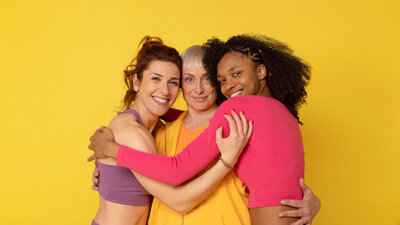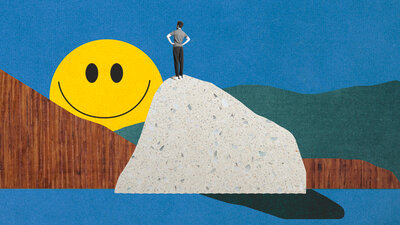Enjoy The Second Half Of Your Life, Baby Boomer!

For the baby boomers‘ generation, pictures such as this one date back to about 50 years.
© Getty Images/ClassicStock/Kontributor/Archive Photos/Photo Media
Oh, the old photographs! Immediately, I picture myself doing wobbly laps on a discarded men’s bike. Or speeding down a hill on blue and yellow disco scooters. I rode to my first dance lesson on a tuned moped and kissed my first love at carnival. A wonderful half a life ago, that was. Three years ago, I celebrated my 50th birthday. The hangover after the party was accompanied by a sinking feeling: From now on, it’s all going downhill! But is that really true?
Some numbers on the baby boomers
People at my age are the youngsters among the baby boomers – the baby-boom generation born between 1962 and 1972. We are now the most important age group in Germany in terms of numbers. 13 million people – or 16.5 per cent of the population – are between 50 and 60 years old today. Also, 51 per cent of the readers of the Apotheken Umschau belong to this age group.
Especially the children in the West of a – back then – still divided Germany grew up in a period of remarkable prosperity. We played outdoors until our mothers called us for dinner. We never suffered from hunger. Thanks to medical progress, we survived measles, mumps and other infectious diseases without harm, enjoyed a comprehensive education, chose our professions and romantic partners ourselves and decided freely for or against having our own children. Today, we tend to be at the upper end of the employment scale, often in responsible positions. Retirement beckons on the horizon. Financially, we tend to be in a good position. On average, 51- to 60-year-olds own net assets worth 140,000 Euros per person – including real estate. And these assets are still growing: Loans have been paid off, the prospect of an inheritance (or more) is on the increase. We are doing pretty, pretty well – and it shows.
‘Never has a 50+ generation been fitter and healthier than today’s’, says Professor Lenhard Rudolph, Chair of Molecular Medicine at the University of Jena. The research scientist at the Leibniz Institute for Research on Ageing – Fritz Lipmann Institute (FLI) in Jena, aged 54, is a baby boomer himself. A little more than a century ago, one would have been dead at an average age of 50.
Today, most baby boomers are in the thick of life instead of the graveyard. Albeit with a ‘spare tyre’ grown out of prosperity: 83 per cent of the 45- to 64- year-olds in Germany are overweight or obese. That increases the risk of diabetes, cardiovascular disease and cancer, observes Professor M. Cristina Polidori, head of Ageing Clinical Research at the University Hospital Cologne. The good news, however: At 50, we have still have plenty of time to change things around. ‘Whether we age healthily depends to more than 70 per cent on our lifestyle. Genes play a minor role’, Lenhard Rudolph opines. But healthy living or not: From 50 onwards, at least the first signs of ageing become noticeable.
How aging works
Our body has great repair mechanisms at its disposal. Every day, it repairs around 55,000 single-strand DNA breaks and 12,000 hereditary building blocks. Within seven years of one’s life, about 90 per cent of our body parts get replaced. We regularly overhaul many types of cells in the body. Theoretically, this could enable humans to live forever.
But unfortunately, evolution pursues other goals. ‘Our body is conditioned to reproduce and to raise offspring’, Rudolph explains. After that, it has done its duty. Most bodily functions reach their peak just before the age of 30. After that, the organism ‘wastes’ less energy on repairing cell damage. As a result, tissue and organs gradually lose their ability to function. From the age of 45, the ageing process picks up speed. The musculoskeletal system, the eyes and ears are often first to suffer.
Fortunately, there are ways and means to counter-act that process.
Nowadays, Women Are Better At Asserting Themselves
Interview: What do I actually want from life? Can I still realise my dreams? The time is ripe for new plans. An interview with developmental psychologist Professor Pasqualina Perrig-Chiello, University of Bern.
Professor Perrig-Chiello, how do people fare in the middle of their lives?
Many are at the peak of their private and professional life. They have good jobs and a place in society. Gradually, however, changes appear on the horizon: Their children are growing up, their own parents need more and more support. Younger people grab for better jobs. Physically, there is a transition from no longer young to being a mature person. The first signs of ageing become noticeable. Around their 50th birthday, many people realise that there is more time behind them than ahead of them.
Does that make people nostalgic?
No one can avoid dealing now with questions such as ‘What have I achieved? And where do I stand?’ In this phase, we re-evaluate what is important to us in our life. Adjustments are worth your while now. After all, we still have an average of 30 to 35 years of life ahead of us.
Why is it worthwhile to realign one’s own life now?
The famous psychiatrist Carl Gustav Jung said that you cannot live the second half of your life according to the model of the first. My research has shown that people in the first half of life have made many compromises in order to position themselves professionally, in the family and socially. In the middle of one’s life, at the latest, a redefinition of the meaning of life and one’s great life goals becomes necessary: Where am I now, what were my dreams, what can I still achieve? What is the point of it all? Many see an opportunity now to make amends or even to reorient their life. Nowadays, there are far more opportunities than there were just a few decades ago. In addition, our understanding of gender roles is usually changing. This gifts us new liberties.
To what extent do gender roles change after 50?
The change is related to hormonal change. For women, the ‘caring hormone’ oestrogen decreases sharply and the ‘masculinity hormone’ testosterone comes to the fore. For men, testosterone slowly decreases and increasingly makes room for oestrogen.
What does this do to men and women?
The hormonal change puts our understanding of gender roles into perspective, the way they have been lived up to until now. Many women begin to live out their edgier sides more and more and thus become more assertive. Men begin to recognise more of their caring and social sides. For both sexes, the spectrum of coping strategies is widening, encompassing elements traditionally described as masculine and feminine, respectively. Those who use this broad spectrum hold the best hand for ageing well. Very old men, who have learned to articulate the need for help and to accept it, benefit. Women, on the other hand, benefit from being able to set boundaries and to assert themselves.






